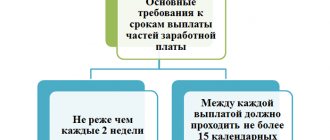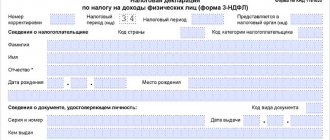Many individual entrepreneurs conduct accounting using a simplified system and cope with it without the involvement of an accountant. Legal entities must have this specialist or an entire specialized department on their staff.
One of the leading positions in any organization is the chief accountant, so his hiring has some specifics. Special requirements are imposed on the applicant; both professional and personal qualities of the applicant are taken into account.
Dear readers! The article talks about typical ways to resolve legal issues, but each case is individual. If you want to find out how to solve your particular problem , contact a consultant:
8 (800) 700 95 53
APPLICATIONS AND CALLS ARE ACCEPTED 24/7 and 7 days a week.
It's fast and FREE !
All financial transactions in companies are carried out in agreement with the chief accountant. He has broad powers and is responsible for material and financial transactions.
Certification and qualifications
Periodic certification, regardless of the profession or the specifics of the organization’s activities, is of two types:
- Compliance with the position held. Such certification is intended to confirm that the professional level of the employee corresponds to the work he performs. This is a mandatory procedure.
- For assignment of a qualification category. This type of certification is voluntary and is carried out on the employee’s initiative.
As a rule, a qualification category is considered valid for 5 years, but an employee can undergo re-certification “for the category” earlier - 2, 3 years after receiving the previous category.
The assigned qualification category is assigned to the employee for the entire period of its validity, even if he works in another institution, organization, or in another locality.
The employee’s qualification level must be reflected in the employment contract (Labor Code of the Russian Federation, Article 57). When assigning a new qualification category, this information is recorded in the contract by an additional agreement.
Job Description Form
There is no strictly established form of job description, therefore it is developed and executed in the manner that applies to the preparation of such documents in the organization itself.
An indispensable condition for the entry into force of a job description is its approval by the head of the legal entity. It becomes mandatory for the employee from the moment he familiarizes himself with it and signs it.
You will find a sample job description for a chief accountant on our website.
How to enter qualification categories in a commercial company
IMPORTANT! Recommendations for certifying an employee for suitability for the position held by ConsultantPlus are available at the link
Commercial firms are not required to conduct certification, but many managers initiate the adoption of local acts, in accordance with which they can certify workers and assign them qualification categories.
Qualification requirements must be developed for each category. They should differ in their level of education and qualifications, take into account work experience and length of service in the profession. When carrying out this work, it is advisable to use reference information. The qualification directory dated 08/21/98 No. 37 details the qualification requirements for a significant number of positions.
Example: in reference book No. 37, for the position of “engineer” there are four qualification positions:
- An engineer as such can have any length of work experience and higher professional education.
- An engineer of the 3rd category only needs to graduate from a specialized university and work as an engineer for 3 years.
- An engineer of category 2 must have a higher professional education and work experience as an engineer of category 3 for at least 3 years.
- An engineer of the 1st category requires a higher education in the profession and work experience in an engineering position of the 2nd category - 3 years or more.
It is assumed that the word “senior” in the job title indicates the presence of subordinates or he alone controls the work of the site. Moreover, if qualification categories have already been established for a position, the word “senior” is not used. This concept is equivalent to category 1.
If a specialist is called a “leader,” he controls the work of subordinate groups and provides general management of a certain area of the company’s work. The leading specialist must have 2-3 years more experience than the same specialist of the 1st category (according to the text of reference book No. 37, clause 7 of the “General Provisions”).
A commercial company has the right not to rely on the provisions of qualification reference books when establishing qualification categories. Their names are reflected in the local regulatory act (Labor Code of the Russian Federation, Article 8), for example, “Regulations on Certification”.
All personnel events, including the certification itself and the receipt of qualification categories, are formalized by order. Based on the results of the certification, changes are made to the staffing schedule and personnel documents of each employee.
Formally, the head of a commercial company is not obliged to conduct certification in order to assign a qualification category to an employee, but it is advisable to do this in compliance with all legal norms. Otherwise, the “distribution” of qualification categories may become the cause of a labor dispute, not excluding workers filing a lawsuit.
On a note! The use of qualification reference books is mandatory only for employees of state and municipal institutions, as well as representatives of professions that provide benefits, compensation, restrictions (Labor Code of the Russian Federation, Article 57, Part 2 “Conditions”, Paragraph 3).
Contents of the job description
Despite the significant difference between the texts of job descriptions that can be created for the chief accountant in a particular organization, its content consists of the same sections.
They are usually formed in the following sequence:
- requirements for qualifications (education, experience, knowledge);
- determining the place in the structure of the organization, the procedure for interaction with other employees;
- job responsibilities of the chief accountant;
- rights;
- responsibility.
Qualification categories of individual professions
For representatives of certain professions, obtaining a qualification category without certification is impossible. These are government officials, teachers, doctors, prosecutors and a number of others.
Voluntary-compulsory retraining. Is there any point in upgrading your qualifications ?
As an example, let’s look at the procedure for certification for obtaining the qualification category of teaching staff. It is regulated by Federal Law No. 273 of 12/29/12 “On Education”, Art. 49, and by order of the Ministry of Education No. 276 dated 04/07/14. The procedure is as follows:
- Certification is carried out at the request of the employee, based on his application.
- The first or highest category is assigned.
- It is possible to submit an application for the 1st category regardless of the length of service in the institution; for the highest category – after 2 years of work.
- The application is considered for no more than a month, and certification deadlines are assigned. A written notification of the place and time of the procedure is sent to the citizen.
- Based on the results, the commission decides in absentia to assign a category or refuse to assign.
For certification, the employee provides a package of documents for consideration by the commission: application; copies of documents on education, on the assignment of categories earlier, if the procedure is repeated; documents to change your surname - if necessary; characteristics from the place of work, portfolio.
What should be included in the Certification Regulations ?
The commission's decision must be made no later than two months after certification. An employee can personally participate in the certification, but in his absence, the documents are reviewed in absentia. If the assignment of a category is refused, a repeated application can be sent to the commission after a year.
Similar procedures are carried out in institutions of other profiles. Thus, obtaining qualification categories by physicians is regulated by Federal Law No. 323 of November 21, 2011 “On the fundamentals of health protection...”, Art. 72-1, by order of the Ministry of Health 240n dated 04/23/13 and a number of other by-laws. Doctors can be assigned the second, first or highest qualification category. It is valid for 5 years.
The procedure for conducting qualification tests should, as a general rule, be reflected in the institution’s LNA and take into account its specifics.
On a note! There are constant changes in the legislation on assigning qualification categories to workers in certain professions. Thus, the project contains innovations for teaching staff that can be adopted this year. Sports school coaches had the opportunity to be certified for one of the qualification categories (Federal Law No. 147 of 4/06/18).
Why do you need a job description?
The activity of any organization begins with determining its structure (division into divisions, departments, workshops, blocks and the distribution of functions between them).
In addition, divisions are assigned responsibility for resolving issues related to the range of their tasks. At the same time, some functions may be placed under the jurisdiction of not 1, but 2 or several divisions or, conversely, not be placed under anyone’s control. To eliminate duplication of functions and the absence of those responsible for their implementation, as well as to ensure an unambiguous distribution of responsibilities between departments, the current structure of the organization and the main functions of the departments are fixed in an internal administrative document. Then the goals, objectives, functions, structure and procedure for interaction with other divisions of the legal entity are prescribed in the regulations for each division. The goal of the head of the organization (or the person appointed by him) when approving these documents is to control the completeness of the reflection of the functions performed by the unit and to eliminate their duplication.
The regulations on the unit, giving an idea of the amount of work that this unit will have to perform, serves as the basis for determining its staffing levels, establishing the qualification level and positions of the required employees, distributing responsibilities between them and developing their job descriptions. Including, it provides material for the job description of the head of the department.
The obligation to develop regulations on departments and job descriptions is not fixed at the legislative level. However, they significantly facilitate the life of the organization itself, bringing clarity to the distribution of tasks between departments and employees within them, as well as defining the circle of those responsible for resolving certain issues.
A job description developed for a specific position allows you to:
- define specific functions for this position and simplify the procedure for familiarization with them;
- facilitate the selection of personnel for vacant positions;
- familiarize the employee with his functions against signature, thereby securing him responsibility for their failure to perform them and his right to refuse to perform someone else’s work without additional payment;
- monitor the performance of a specific employee and the correct distribution of functions.
Instructions for a number of positions may be standard, but it is better to develop them for each organization independently and individually, based on the specifics of the activities of a particular legal entity, the characteristics of its industry, structure and delimitation of areas of responsibility between divisions. This document is given legal force by its approval by the head of the organization.
Entry into the work book and personal card
IMPORTANT! A sample entry in the work book for advanced training from ConsultantPlus is available at the link
The personnel service is required to reflect the assignment of qualification categories in all personnel documents. In addition to the staffing table and employment contract, personnel orders, it is mandatory to reflect information about qualifications in the employee’s work book.
In accordance with the Instructions for filling out work books, approved by Decree of the Ministry of Labor dated 10/10/03 No. 69, clause 3.1:
- a record of the assignment of a new rank, class, category must be made in the work book;
- the basis for making an entry is the order of the manager.
Entries must be made no later than seven days and comply with the text of the order on assignment of a qualification category (Rule No. 225 of 04/16/03, on maintaining work books, p. 2-10). A record of certification for the purpose of establishing a qualification category is also entered into the employee’s Personal Card, in p. 4 “Certification” (form T-2).
Functions of the chief accountant of a large enterprise
The chief accountant of a large enterprise has practically no opportunity to do actual accounting. The priorities in his work are:
- organization of an accounting scheme that covers in its full diversity all aspects of the enterprise’s activities;
- organization of complex document flow;
- development of an accounting policy that is significantly more detailed and voluminous than in a small legal entity;
- distribution of accounting functions among accountants, organization of their precise work, interaction and interchangeability;
- control and linkage of data used for the preparation of all types of reporting, including internal and statistical;
- generating reports as fully as possible using all forms of existing reports and drawing up the necessary explanations;
- calculation of a larger number of taxes, some of which are usually irrelevant for a small organization;
- mandatory participation in financial analysis and calculation of forecast data;
Read about methods for analyzing a financial results statement in the article “Methods for analyzing a profit and loss statement .
- working with inspectors during audits;
- a large amount of work in order to respond to various types of requests relating to accounting and taxation issues.
Where to get training
In addition to higher education, there are a number of short-term training on the market, usually lasting from a week to a year.
Interregional Academy of Construction and Industrial Complex and its courses in “Accounting, Analysis and Audit”.
The Institute of Professional Education "IPO" invites you to take distance courses in the field of "Accounting, Analysis and Audit" (there are options 256, 512 and 1024 academic hours) to receive a diploma or state-issued certificate. We have trained more than 8,000 graduates from almost 200 cities. You can undergo external training and receive interest-free installments.
Group D, or employees submitting consolidated statements
The educational requirements for such employees are similar. But to compile and provide consolidated reporting, the chief accountant will need work experience:
- at least five of the last 7 calendar years of work in management positions related to the preparation of accounting or auditing activities;
- at least three years out of the last 5 with a higher specialized education.
The skills, abilities and knowledge that will be needed to perform the work are described in section 3.4 of the professional standard. To maintain a professional level, specialists are recommended to annually take advanced training courses lasting at least 20 hours.
Accounting: responsibilities
The list of responsibilities of an accountant depends on the specialization of the position and the need to apply a professional standard. Let us outline the main tasks.
Responsibilities of a payroll accountant (salary):
- calculation of wages and other remuneration for labor on the basis of personnel documentation and accounting sheets;
- calculation of benefits, scholarships, vacation pay and other types of payments;
- calculation and payment of taxes, fees and contributions from wages;
- preparation of salary reports to the Federal Tax Service, Rosstat, Social Insurance Fund and Pension Fund of Russia;
- participation in audits by extra-budgetary funds and the tax service.
Responsibilities of a material table accountant (property: fixed assets, inventories, warehouse)
- reflection of receipts, movements and disposals of property assets of the enterprise;
- depreciation calculation for fixed assets;
- conducting an inventory of fixed assets and medical supplies;
- preparation of reports to regulatory authorities on property assets.
Responsibilities of a billing accountant
- accounting of settlements with counterparties;
- carrying out inventory and reconciliation of calculations;
- work with accounts payable and receivable;
- preparation of reports on the designated area.
Cashier responsibilities
- drawing up cash documents, orders;
- reflection of cash flow transactions in the cash book;
- responsibility for preparing the cashier's daily report;
- control over compliance with the cash limit, transfer of surplus to current accounts;
- strict compliance with the requirements of Directions 3210-U;
- conducting settlements with accountable persons;
- reflection of transactions on the organization's current accounts;
- Preparation of reports for the designated area.
Responsibilities of the chief accountant:
- control over the work of subordinates;
- preparation of financial statements;
- organization of internal financial control;
- participation in the planning and development of regulatory and administrative local documents for the institution;
- drawing up and adjusting accounting policies for the corresponding financial period.
Responsibility for misconduct
This section of the job description cannot contradict the Labor Code of the Russian Federation and other regulations. That is, the employer does not have the right to introduce its own system of fines for misconduct, tardiness and other deviations from work standards.
What responsibilities should be provided:
For improper performance or failure to fulfill one’s official duties as provided for in this job description and causing moral damage - “in the manner established by the current labor legislation of the Russian Federation.”
For offenses and crimes committed in the course of their activities - “in the manner established by the current administrative, criminal and civil legislation of the Russian Federation.”
Target
In accordance with the text of the standard, the main goal of persons who are engaged in accounting is to generate documented and systematized information about accounting objects, to draw up accounting (financial) statements on its basis, disclosing information about the financial position of an economic entity as of the reporting date, the financial result its activities and cash flows for the reporting period, necessary for users of these statements to make economic decisions.








